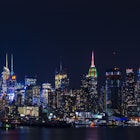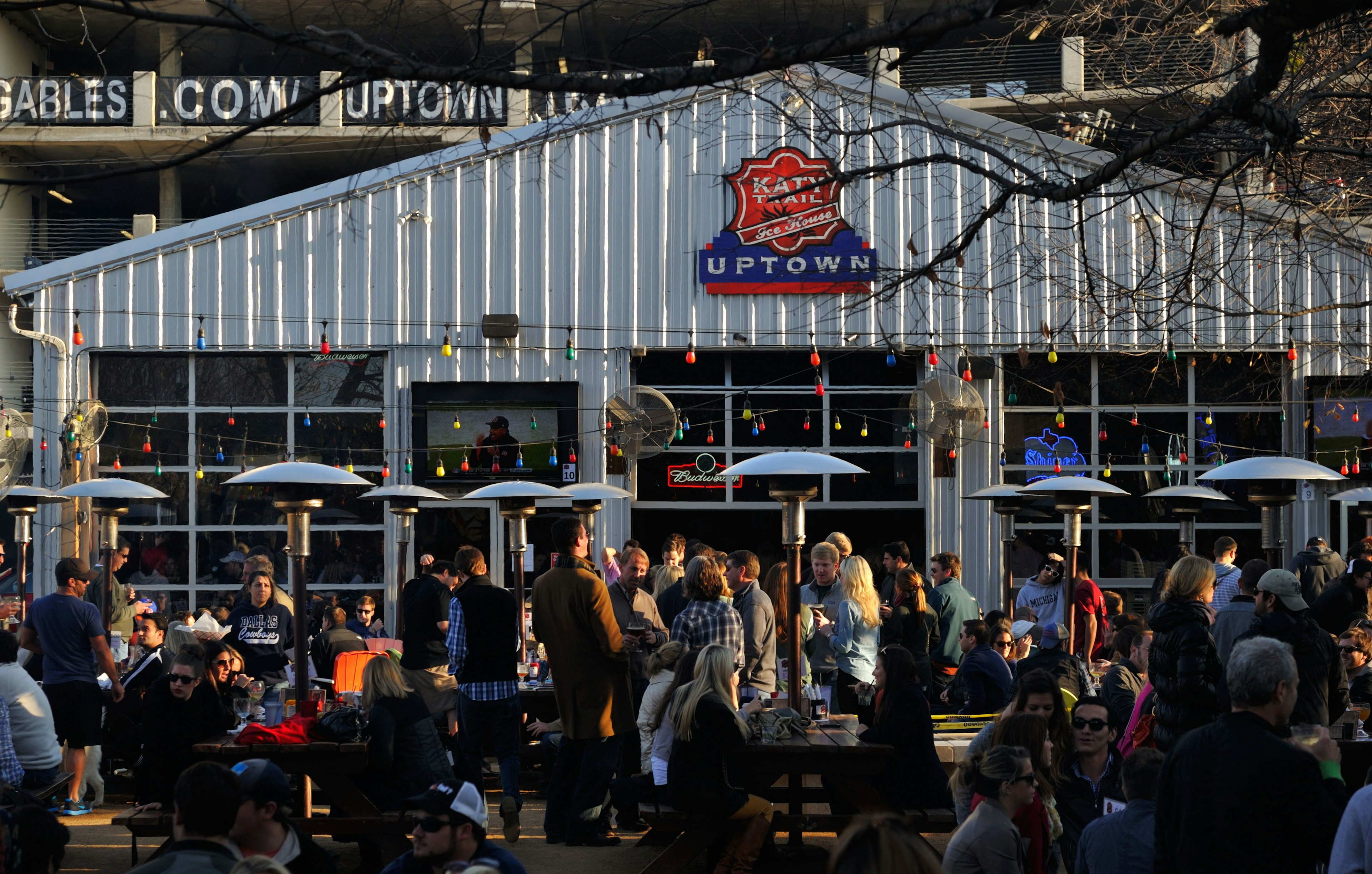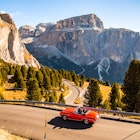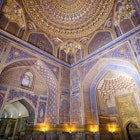
The best neighborhoods in Dallas for a taste of the real Texas


There's much more to Dallas than Downtown – head to the city's lively neighborhoods to find out what makes Dallas tick © John Coletti / Getty Images
Texas has a reputation for being big and bold – sometimes even brash – but Dallas unveils the state in all its rich complexity. Sure, you'll find big and bold experiences, but you'll also find quirky, offbeat neighborhoods that capture the many facets of the city's varied character.
Downtown delivers on top-flight museums and history (including, of course, the assassination of JFK in 1963) but it's the less famous districts that show off the best of Dallas. From the historic blues hotbed of Deep Ellum to cosmopolitan, monied corners such as Highland Park, and from the hip quarter of Trinity Groves to the Hispanic heritage of Oak Cliff, there's a lot to experience.
If you're wondering which neighborhood is right for you as a home base for a trip to Dallas, we've got you covered. Here are the eight essential districts in Dallas for foodies, history buffs, art fiends, antiquers, shoppers, after-hours rockers, and everyone in between.
Downtown
Best for museums and history
Downtown Dallas is full of pioneer heritage, tragic mid-century history, contemporary architecture and public art – a heady blend that gives visitors a fast snapshot of The Big D's defining moments in the century and a half since it was incorporated. Bounded by the city's soaring freeways, the neighborhood's edges are I-345, I-35E, I-30, and Woodall Rodgers Freeway, creating a neat central hub that's easy to explore.
Contrary to Dallas' sprawling reputation, this is one part of the city you can investigate without having to hunt around for parking spots. Downtown is only about a mile square, and it's well-served by public transportation. The neighborhood has two hubs – the DART Rail Convention Center Station and Union Station, which receives Amtrak, the Trinity Railway Express commuter rail, and Dart – not to mention the McKinney Ave trolley that will get you from museum to museum.

Pioneer Plaza harkens back to Dallas' days as a cattle trading hub, with 40 bronze steers marking the site of an old rail yard and warehouse that was a vital stop on the Texas cattle drivers' trail. Nearby is the Pioneer Cemetery, which dates back to the city's foundation and includes graves of the city's first four mayors.
To learn more about this period of Dallas history, head a mile south of downtown to the Dallas Heritage Village, where a number of early structures have been preserved, from an Indigenous tipi and a Civil War plantation house to slave dwellings and Victorian homes. These structures were largely rescued from freeway construction projects and the development of the DFW airport, and relocated to the site of one of the city's first parks.
One of the busiest destinations in downtown Dallas is, of course, the site where John F Kennedy was assassinated on 22 November 1963. Tourists flock to Dealey Plaza & the Grassy Knoll and the Sixth Floor Museum to learn more about an event deeply lodged in the American collective consciousness, and the conspiracy theories that emerged in the decades following.

Thanks-Giving Square is a gentler memorial – this public space opened a year after the Kennedy assassination in 1964, and invites visitors to meditate, reflect on gratitude, and connect with their community.
Also part of downtown is the colorful Arts District, where you'll find an impressive clutch of museums. The Dallas Museum of Art, Nasher Sculpture Center, and Crow Collection of Asian Art are all here, clustered along the border of Klyde Warren Park, which caps the Woodall Rodgers Freeway.
Don't forget to look up as you stroll downtown, or you might miss Dallas' iconic architecture. Downtown's famous neon Pegasus Sign now flies by the Omni Dallas Hotel, while Reunion Tower connects to the Hyatt Regency Dallas and offers panoramic views from the interior of its iconic, glittering disco ball.

Oak Cliff and Bishop Arts
Best for Hispanic heritage
Musical and sporting greats such as T-Bone Walker, Dennis Rodman, Stevie Ray Vaughan and Erykah Badu came straight outta Oak Cliff, a traditionally blue-collar neighborhood in South Dallas bound by I-30, Loop 12, I-45, and the Trinity River.
Parts of what is now Oak Cliff, particularly the Tenth Street Historic District, have roots in communities founded by former slaves after emancipation – indeed, this district has the distinction of being one of the few surviving Freedman's towns in the US. Oak Cliff was eventually annexed into the Dallas sprawl and became a turn-of-the-century streetcar suburb. You can still see the architectural legacy of this period in areas such as Winnetka Heights.
By the 1920s the Ku Klux Klan had established a Klavern here, determined to keep the increasingly white neighborhood segregated. Times change – a century later and Oak Cliff is more diverse than ever, with a rich and well-established Hispanic community.
You can experience some of the neighborhood's Hispanic heritage at the Oak Cliff Cultural Center, the Mercado369 gallery, restaurants such as El Ranchito and La Palapa del Sabor, and along Jefferson Blvd, with its shops packed with quinceanera dresses, elaborate pinatas, and classic Tejano albums on vinyl and cassette.
Oak Cliff is in the grip of gentrification, however – especially on the fringes of the happening Bishop Arts District, a tight-knit section of northeast Oak Cliff edged by Davis Street, North Tyler, West 9th, and North Zang Boulevard. This lively strip has become a hip destination for bars, restaurants, and shopping.
Grab a cup of coffee at Oddfellows, browse the stacks at the Wild Detectives indie bookstore, and grab a tasty bite at spots such as Ten Bells Tavern, Emporium Pies and Boulevardier. There's plenty of good antiquing, too, as well as vintage clothing stores, comic book shops, barbers, salons, and even a nostalgic cigar shop for stogie aficionados.

Deep Ellum
Best for music and nightlife
Like Oak Cliff, Deep Ellum got its start as a Freedman's town – but unlike its neighbor across town, Deep Ellum remained the beating heart of Dallas' Black community well into the 20th century. By day, residents worked in factories like Henry Ford's brand-new automobile plant, and by night, Deep Ellum's nightclubs trailed only Bourbon Street and Beale Street in their cultural significance at the height of the Jazz Age.
The neighborhood drew musicians such as Blind Willie Johnson, Lead Belly and Bill Neely – as well as Blind Lemon Jefferson, who ultimately settled in Deep Ellum. The music rocks on at venues such as Twilite Lounge, Double Wide and Trees. Deep Ellum is also full of fun eateries for a pre-gig meal – make a beeline for Serious Pizza and Pecan Lodge.
The construction of Dallas' labyrinthine freeways took a toll on Deep Ellum, but the music scene had a strong resurgence during the 1990s, providing a forum for up-and-coming punk, grunge, garage and alternative bands. Hometown heroes such as Toadies and Erykah Badu took to the stages of such legendary venues as The Bomb Factory and Trees, and the cultural revival eventually inspired the Deep Ellum Arts Festival.
Today, this is still one of the best neighborhoods in Dallas for a night out. You can see all sorts of local and regional acts – including bands born out of the University of North Texas College of Music in Denton just north of Dallas, which produced such stars as Roy Orbison, Meat Loaf and Don Henley.
By day, sift through vinyl while sipping a pint at Off the Record, enjoy a tight ten at Dallas Comedy House, get a trim with a brew at the High & Tight Barbershop, wander past dozens of colorful murals, pick up some kicks at Sneaker Politics, or commemorate your visit with a permanent souvenir at Elm Street Tattoo. If you want to stay close and avoid shelling out on Ubers after hours, bed down at the Deep Ellum Hostel.
Before you leave the neighborhood, be sure to wave to The Traveling Man, a triptych of sculptures of a folksie robot by local artists Brad Oldham and Brandon Oldenburg. Look for these metallic hobos near the DART Light Rail station, at the corner of Gaston and Good Latimer, and the corner of Good Latimer and Elm Street.

Greenville
Best for street food
On either side of Greenville Avenue between Mockingbird and Belmont is one of the trendiest places to eat out, shop, and relax in Dallas. About 10,000 Dallasites live in the neighborhood, which is split into two halves known colloquially as Upper and Lower Greenville.
The district is an eclectic blend of new luxury condos, historic homes, and tall-and-skinny developer deals, plus plenty of hotels for travelers who want to make this district their home base – recommendations include the Highland Dallas and Beeman Hotel. There's plenty of shopping to do too, whether you're looking for vintage, funky t-shirts, or reliable chains such as Buffalo Exchange.
Since the 1940s, the Granada Theater has anchored the neighborhood's entertainment scene. But many of the most popular attractions have a distinctly more modern feel, from ramen shops and coffee houses to a local-favorite beer garden ringed by a flotilla of food trucks, appropriately called the Truck Yard.
The little sibling (literally) of Deep Ellum's Double Wide bar is here – a teensy watering hole called Single Wide. Alternatively, head to Balcony Club for stellar jazz music, or go slightly further afield to neighboring Lakewood, where you'll find the Dallas Arboretum & Botanical Gardens, and Goat, one of the city's most agreeably gritty blues bars.

Highland Park
Best for living the high life
Highland Park has been famous as one of the city's bougiest neighborhoods since the 1980s, when the soap opera Dallas was filmed there. Four decades have passed but the district is still very affluent and the shoppers at the chichi Highland Park Village mall are draped in designer duds.
Still, Highland Park has its whimsical side – with kids in tow, pack a picnic and visit the giant teddy bear sculptures in Lakeside Park, a favorite spot for snapping photos. Grab a bite at Javier's, a dark and old-school Mexican steakhouse with valet-only parking.
Or head to Abacus for the lobster shooters – if you time your visit right, you might encounter special menus such as four-course wine dinners. To come back down to earth, go for a walk or run on the Katy Trail – a 3.5-mile pedestrian greenway that runs from Highland Park to Uptown.

Uptown
Best for a hipster vibe
Uptown is an agreeably walkable find in this car-loving city but it's anything but pedestrian. While the district isn't quite as fancy as Highland Park, Uptown was founded as a Freedman's town after the Spanish American and Civil Wars and has since evolved into a hip district for young professionals who appreciate having urban amenities right on the doorstop.
Here you'll find juice bars, restaurants dedicated to "clean eating," cool coworking hubs where you can hotdesk, and grown-up video arcades such as Kung Fu Saloon. Amidst the brand-new apartment buildings and condo towers, you'll also find hip boutique hotels such as the maximalist Hotel ZaZa and the sleek Crescent Hotel Dallas.
In true millennial fashion, Uptown also reaches out to dog-lovers – just ask the folks at Mutt’s Canine Cantina, a bar, restaurant, and dogpark in one. If the heat is on, grab some Vitamin D and a drink at the Katy Trail Icehouse, a favorite spot for locals to cool off with giant margaritas under the mist fans at the end of the eponymous walking and cycling trail that starts in Highland Park.
There are lots of shopping opportunities along Knox Street (which turns into Henderson Avenue) as well as in the West Village. Between Uptown and Downtown, you can catch a Dallas Mavericks or Dallas Stars game at the American Airlines Center, too.

Design District
Best for an arty attitude
Just west of Uptown, the Design District is flush with a mix of art galleries, vintage shops, and more suburban fare such as old-style bowling, water parks, the Renaissance Faire chain Medieval Times, and a vast wholesale emporium called Dallas Market Center. Condos and breweries have steadily been trickling into the neighborhood, along with a Richard Phillips sculpture that used to sit in the west Texas desert, the somewhat infamous Playboy Marfa.
The Design District is trying to catch up to Uptown with pedestrian projects such as the Trinity Strand Trail, a 2.5-mile walking and bike path that follows the paved-over bed of the Trinity River. The Design District is still growing and eventually, the path will be about as long as the Katy Trail.
In the meantime, grab a burger at Rodeo Goat or the venerable Mama's Daughter's Diner (it's been open since the 1950s), or fuel up with a flat white from the Aussie-style Ascension coffee shop. You'll need your energy levels high for a long day scouring this shopping district for decor, antiques and other treasures. The Design District is still evolving – and has plenty left to discover.

Trinity Groves
Best for discovering the reinvented Dallas
Trinity Groves is less an organically-grown neighborhood, and more a strategic development, but it's still one of the trendiest places to spend an afternoon or night out. Wedged into a curve of the Trinity River just south of the Design District, Trinity Groves sits at the base of the Margaret Hunt Hill Bridge, which crosses the river to connect to downtown.
Reclaimed from Dallas' formerly fickle flood plain, these 15 acres have been put to use incubating restaurants and studio spaces for artists, and creating a sculpture park and walking trails. Part of Trinity Groves is the Tin District, once a melting pot for Dallas' immigrant communities – today, it's a melting pot of entrepreneurial concepts from trapeze studios to tattoo shops to art galleries.
Come for the great views of the Dallas skyline and its most recognizable towers, from the Bank of America Plaza (better known to locals as the 'Jolly Green Giant' because of its neon outline) and the sparkly knob of Reunion Tower. Stay for the eats and drinks, which blend current trends with Texas constants such as barbecued meats, beer and burritos.
Explore related stories



 Budget TravelThe cheapest time to visit Colorado, plus tips for staying on a budget
Budget TravelThe cheapest time to visit Colorado, plus tips for staying on a budgetNov 21, 2024 • 9 min read




 AstrotourismCopy My Trip: Exploring Uzbekistan's cities, deserts and mountains
AstrotourismCopy My Trip: Exploring Uzbekistan's cities, deserts and mountainsNov 21, 2024 • 5 min read

